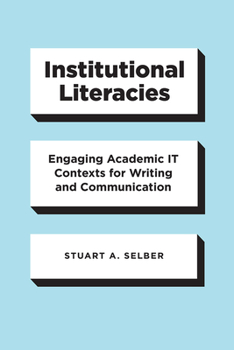Institutional Literacies: Engaging Academic IT Contexts for Writing and Communication
Information technologies have become an integral part of writing and communication courses, shaping the ways students and teachers think about and do their work. But, too often, teachers and other educational stakeholders take a passive or simply reactive role in institutional approaches to technologies, and this means they are missing out on the chance to make positive changes in their departments and on campus. Institutional Literacies argues that writing and communication teachers and program directors should collaborate more closely and engage more deeply with IT staff as technology projects are planned, implemented, and expanded. Teachers need to both analyze how their institutions approach information technologies and intervene in productive ways as active university citizens with relevant expertise. To help them do so, the book offers a three-part heuristic, reflecting the reality that academic IT units are complex and multilayered, with historical, spatial, and textual dimensions. It discusses six ways teachers can intervene in the academic IT work of their own institutions: maintaining awareness, using systems and services, mediating for audiences, participating as user advocates, working as designers, and partnering as researchers. With these strategies in hand, educators can be proactive in helping institutional IT approaches align with the professional values and practices of writing and communication programs.
Format:Hardcover
Language:English
ISBN:022669920X
ISBN13:9780226699202
Release Date:December 1995
Publisher:University of Chicago Press
Length:272 Pages
Weight:1.20 lbs.
Dimensions:0.7" x 6.0" x 9.0"
Customer Reviews
0 rating





